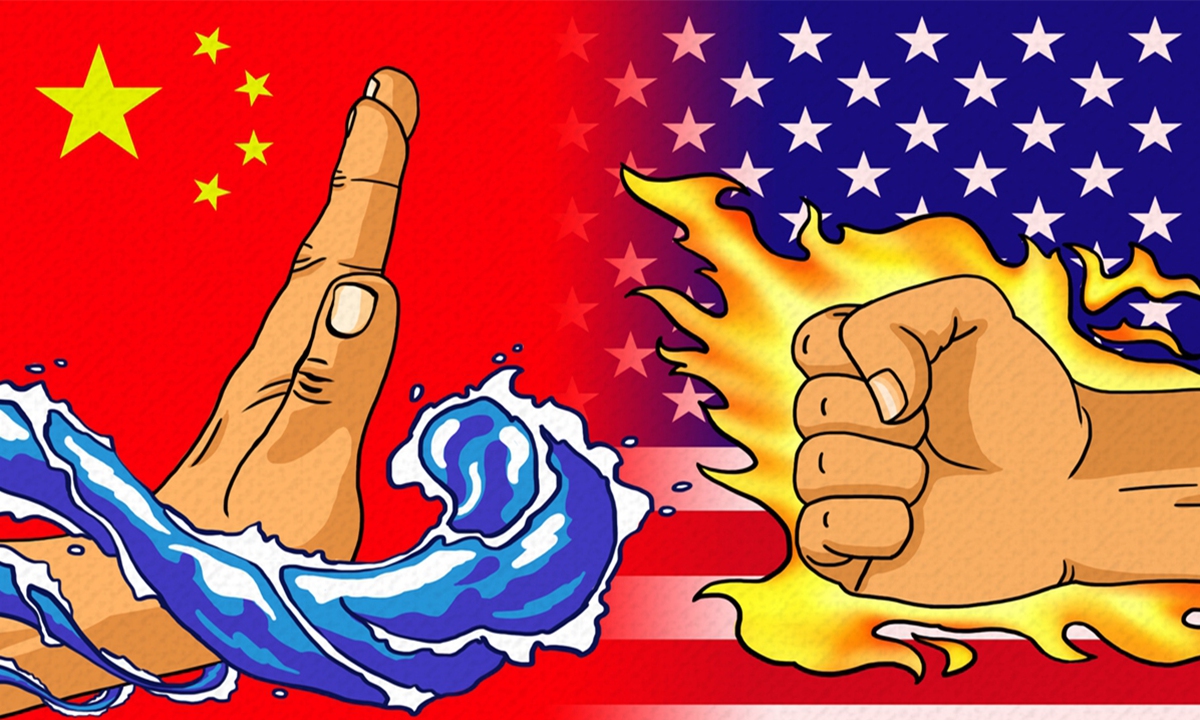US escalates cold war by demanding China close Houston consulate
Source: Global Times Published: 2020/7/22 17:36:55

Illustration: Liu Rui/GT
Editor's Note:
The US has abruptly asked China to close its Consulate General in Houston within 72 hours. From high-tech, media to the diplomatic fields, is the US leading bilateral relations to an all-out new cold war? What is the intention behind such a drastic US move? The Global Times talked to two experts over this incident.
Wu Xinbo, dean of the Institute of International Studies, Fudan University
According to my understanding, it is a move to pressure Beijing to get more US diplomats back to their posts in China. Since the outbreak of the COVID-19, the US had hurriedly evacuated quite a number of American diplomats and citizens from China. Now Washington believes it is time for them to continue their China mission. Yet negotiations on their return did not go quite smoothly.
The US has postponed flights for dozens of its diplomats who had planned to return to China "after failing to reach agreement with Beijing over issues including COVID-19 testing and quarantine," according to a Reuters report on July 1.
However, Chinese Foreign Ministry spokesperson Zhao Lijian said on July 2 that China's quarantine measures "apply equally to all foreign diplomatic missions to China."
If they want to come back, it is only natural and logical for them to abide by relevant regulations of the Chinese side. China will only deny their application when they refuse to do so. But the US adopted a crazy method - closing the Chinese Consulate General in Houston.
The US is currently trying very hard to promote a confrontation between Beijing and Washington. No matter whether they are heading toward a new cold war, the US is at least escalating previous competitions to a new level - confrontation. It is deliberately creating a standoff. The Chinese consulate general incident is proof of this.
In months to come, those China hawks in the White House will launch more attacks and provocations against Beijing, further jeopardizing the bilateral relationship.
To some extent, they are now trapped in a state of anxiety and craziness in a period of countdown to November 3. Whether they could still be in power after the November US presidential election is their biggest concern. All they can do is to seize every opportunity to attack China, shaping more confrontations. China will surely take reciprocal countermeasures. This means tensions will run high between Beijing and Washington. This is inevitable.
Wei Zongyou, a professor at the Center for American Studies, Fudan University
It has been quite some time that China and the US have remained locked in negotiations over conditions for the return to China of US diplomats and their family members. The harsh requirement for the closing of the Chinese Consulate General in Houston can be regarded as the US retaliation over this dispute.
Another reason is probably the high profile of the Chinese Consulate General in Houston during the coronavirus fight. A CNN report said that the Chinese Consulate General in Houston in May donated $11,000 in food to a hospital in Monroe, Louisiana, home to the Chennault Aviation and Military Museum, as the medical center grappled with the coronavirus epidemic. This may be perceived as an "insult" to the US government which did a poor job with this epidemic compared to what the Chinese government has done. In addition, the outdated mentality of the US government makes it believe that China is wielding its political influence through these charitable moves.
Now the US is in a state of extreme nervousness. This time, the Trump administration is extending its hard-line approach toward the diplomatic field. This shows the new normal in the China-US relations. The hard-liners in the Trump administration are indeed leading bilateral relations to a new cold war. Meanwhile, the US is wooing Western countries to stand with it in the same anti-China camp. US Secretary of State Mike Pompeo will deliver a speech on "Communist China" and the future of the free world on Thursday. He is anticipated to hype up the "China threat" and call on Western countries to come together with a unified front.
Just on Tuesday, US Secretary of Defense Mark Esper said he hopes to visit China this year, noting that the US is "not in search of conflict" with China. This shows the complexity and multi-dimension of the US' China policy. China should keep alert of the intentions of those China hawks in the US leading bilateral relations to a new cold war.
Posted in: VIEWPOINT